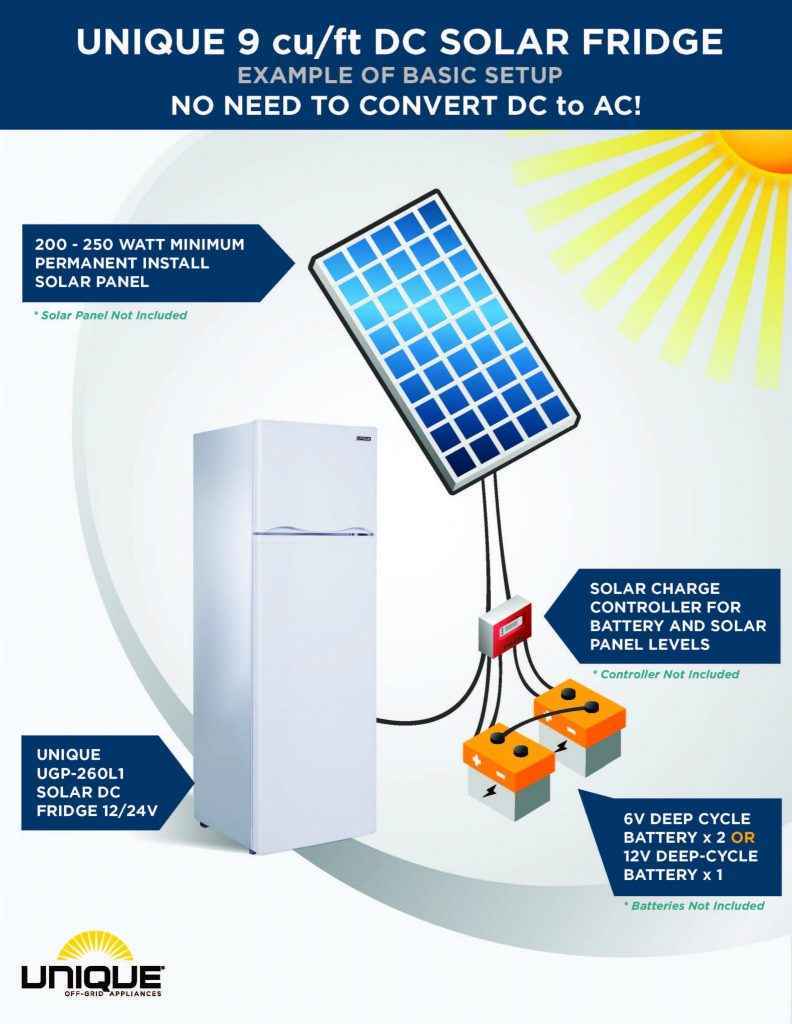Find the most reliable solar refrigerator today for sustainable cooling.
Wiki Article
Opening the Prospective: How Solar Fridge Can Transform Your Energy Consumption
The introduction of solar fridges presents an engaging possibility to improve our method to energy usage. By efficiently using sustainable solar power, these systems promise not just to decrease reliance on conventional energy sources however likewise to improve food preservation and safety and security, particularly in underserved areas.How Solar Refrigerators Job
Solar refrigerators run by harnessing solar power to power their cooling devices, effectively using renewable resources to maintain low temperature levels. These systems normally are composed of photovoltaic (PV) panels that transform sunshine right into electricity. This power is after that used to run the compressor, follower, and other components necessary for refrigeration.The main device in a solar refrigerator is the vapor-compression cycle, comparable to standard refrigerators (solar refrigerator). The compressor compresses refrigerant gas, increasing its temperature and pressure. This gas after that travels through a condenser, where it launches warmth and condenses right into a fluid state. The fluid cooling agent streams into an expansion shutoff, where it swiftly broadens, cooling down prior to going into the evaporator. In the evaporator, the refrigerant absorbs warmth from the interior of the refrigerator, thus reducing its temperature level.
Solar fridges might likewise integrate battery storage systems, allowing them to operate during non-sunny hours or in over cast problems. This makes sure a constant cooling effect, making them appropriate for different applications, especially in remote areas doing not have accessibility to reliable electricity. By incorporating solar innovation, these refrigerators add to energy performance and sustainability in food storage space and conservation.
Trick Benefits of Solar Refrigeration
The assimilation of solar modern technology into refrigeration systems provides various advantages that expand beyond mere power cost savings. Among the most considerable benefits is the reduction of carbon impact. By utilizing eco-friendly solar power, these systems minimize reliance on fossil gas, adding to a much more sustainable environment. This change is especially crucial in regions where power supply is unstable or non-existent, permitting communities to preserve food preservation and safety.
In addition, the usage of solar power can result in energy self-reliance, enabling customers to create their own power and lower susceptability to changing energy costs. Overall, the fostering of solar refrigeration provides a multifaceted option that not only addresses power consumption but additionally promotes ecological sustainability and improves food conservation abilities in underserved communities.
Power Cost Savings and Efficiency
With the climbing expenses of energy and increasing awareness of environmental issues, power savings and performance have actually become critical considerations in refrigeration technology (solar refrigerator). Solar refrigerators leverage renewable energy sources, dramatically lowering reliance on standard power grids. By utilizing solar energy, these systems reduce power intake, making them a financially practical option for both domestic and commercial applicationsThe design of solar refrigerators includes innovative insulation materials and energy-efficient compressors, which make sure optimum performance while using marginal power. Lots of solar fridge models also include programmable settings and wise innovation that allow users to monitor and manage power use successfully. This smart style brings about minimized electrical power bills and lower operational expenses over time.
In addition, solar refrigerators are outfitted with batteries that keep excess energy produced throughout bright days, making it possible for continual procedure also during durations of reduced sunlight. This capability improves their efficiency, making certain that food and disposable things are constantly kept at risk-free temperatures.
Ecological Effect and Sustainability
Using renewable resource not just improves power savings however also substantially contributes to environmental sustainability. solar refrigerator. Solar refrigerators operate clean, eco-friendly power sources, reducing dependence on nonrenewable fuel sources that contribute to greenhouse gas discharges. This change in power intake mitigates environment modification influences and cultivates a much healthier planet
Furthermore, solar refrigerators are especially advantageous in remote areas where electrical power access is restricted or non-existent. By offering a feasible refrigeration remedy without the demand for considerable infrastructure, they promote sustainable development in underserved neighborhoods. This accessibility not try these out only enhances food security yet additionally lowers food wasting, therefore reducing waste.
Selecting the Right Solar Fridge
Selecting the suitable solar fridge requires cautious factor to consider of numerous factors to guarantee ideal efficiency and performance. First, evaluate the energy requires based upon your intake patterns. Determine the overall electrical power needed to maintain your products cool down, which assists in picking an unit with a suitable solar panel size to satisfy these demands.

One more essential element is the sort of solar refrigerator-- compressor or absorption. Compressor versions are typically extra efficient and much better suited for atmospheres with fluctuating temperatures, while absorption fridges may be more effective for off-grid applications as a result of their simplicity.
Last but not least, guarantee the device has reputable solar parts, including panels, batteries, and a charge controller, to ensure lasting functionality. By very carefully taking into consideration these variables, you can select a solar refrigerator that straightens with your power goals and contributes to sustainable living.
Verdict
In recap, solar refrigerators represent a considerable innovation in power consumption, providing a sustainable option to typical refrigeration methods. By utilizing solar energy, these systems not only minimize dependence on fossil gas yet additionally enhance food safety and security and lessen ecological effect. The combination of innovative modern technologies makes certain efficiency and cost-effectiveness, advertising power freedom. As the look at here now fostering of solar refrigeration rises, a transformative change in the direction of cleaner power methods and minimized food waste is prepared for, adding favorably to worldwide sustainability efforts.Report this wiki page